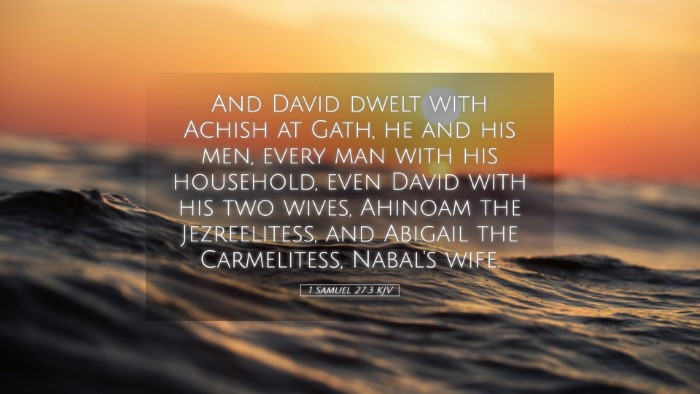Commentary on 1 Samuel 27:3
1 Samuel 27:3 states, “And David dwelt with Achish at Gath, he and his men, every man with his household: even David with his two wives, Ahinoam the Jezreelitess, and Abigail the Carmelitess, Nabal's wife.” This verse provides a profound glimpse into David's experiences during his flight from Saul and his complex interactions with the Philistines.
Context and Background
This passage situates David amidst a crucial period in his life, where he is grappling with the pressures of evading King Saul. The larger narrative of 1 Samuel provides insights into David's anointing, his rise to prominence through battles, particularly against Goliath, and his subsequent victimization at the hands of Saul. This context adds depth to the description of David’s residency in Gath, one of the chief cities of the Philistines.
David's Refuge in Gath
David's choice to dwell with Achish, the king of Gath, highlights his strategic acumen as well as his dire circumstances. His actions can be interpreted through various lenses:
- Desperation: David's decision reflects a moment of desperation. Fleeing from Saul's relentless pursuit, Gath seemed a refuge, albeit a perilous one considering David's past as a formidable enemy of the Philistines.
- Integration: David assimilating into Philistine society reveals his adaptability and resourcefulness, traits that would serve him well as he later united Israel.
- Faith in Adversity: There is an underlying faith demonstrated here. While David is not explicitly seeking the Lord in this passage, he nonetheless seems to trust in God’s sovereign plan, even amidst difficult choices.
The Significance of Companions
David is described as being with his men, a band of loyal followers, and their households. This collective presence underscores themes of brotherhood and loyalty:
- Solidarity: David's leadership is reflected in how he gathered his men and their families, portraying a deep sense of communal strength.
- Protection: By bringing their families into Gath, David ensured their protection, although this move also exposed them to potential dangers from the Philistines.
The Wives of David
The verse mentions David’s two wives, Ahinoam and Abigail, which leads to several observations:
- Cultural Significance: Polygamy in ancient Israel was not uncommon, and mentioning both wives emphasizes familial alliances and David’s status.
- Symbolism of Relationships: The presence of his wives signifies the importance of personal relationships during times of upheaval. In the tumult of fleeing from Saul, family becomes a source of emotional support.
Theological Reflections
This verse invites richer theological reflection on several themes:
- God's Sovereignty: Amidst the complexities of human choices and the seeming chaos in David's life, God's overarching plan remains intact. David's sojourn in Gath is not the end of God's purpose for him, as evident in his future kingship.
- Human Nature and Choices: David’s decision to reside with the Philistines can be seen as a compromise. This aspect raises questions about faithfulness versus practicality in the choices that leaders must make.
- Redemptive History: David, despite his actions, is part of God's redemptive narrative. His time in Gath was instrumental in developing his leadership qualities and would later influence his reign over Israel.
Conclusion
In summary, 1 Samuel 27:3 serves not only as a historical account but as a profound testament to the human experience of navigating challenges in faith and leadership. David’s temporary residence in Gath invites readers and scholars alike to reflect on the tension between faith, fear, and trust in God’s plan amidst adversity. The insights from public domain commentaries enrich our understanding of this passage, affirming its relevance for pastors, students, theologians, and Bible scholars today.


